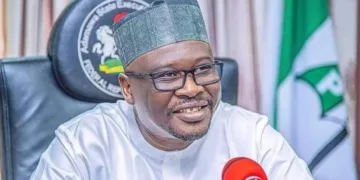President Bola Tinubu has disclosed that in the fight against financial crimes and terrorism financing, Nigeria has prosecuted over 100 terrorist financiers in the last two years.
Tinubu, who was represented by the secretary to the government of the federation, George Akume, stated this in Abuja yesterday at the National Anti-Money Laundering, Combating Terrorism Financing and Counter-Proliferation Financing (AML/CFT/CPF) Compliance Summit.
He said, “We have made progress in tackling the threats of terrorism and other violent crimes through the gallant action of our frontline troops and our security agencies. However, in line with the National Counter-Terrorist Financing Strategy, we have also enhanced our abilities to identify and pursue those individuals who finance these violent acts. Through the efforts of the office of the national security adviser and the attorney-general of the federation, we have prosecuted and convicted over 100 terrorist financiers in the last two years.
“By taking away the funds, resources and material support behind Boko Haram and ISWAP, we are denying them the ability to inflict terror on our communities and citizens. We are creating an environment in which our rural areas will thrive once again.”
Tinubu further said this approach of targeting finance and following money is recognised as a global best practice in combatting serious crime. “We are utilising this approach as a fundamental component of our national strategies to combat serious criminal offences. “Beyond terrorist financing, we are effectively targeting the illicit proceeds of criminal activity,” he stated.
Also speaking, the chief executive officer of the Nigerian Financial Intelligence Unit (NFIU), Hafsat Abubakar Bakari, called on stakeholders to collaborate with the organisation to succeed in mitigating risks and safeguarding Nigeria’s financial system.
She said, “The fight against financial crimes is not one that any single entity can win alone. It requires the collective strength and commitment of our political leaders, regulators, financial institutions, law enforcement and security agencies, and international partners.
“Collaboration must be at the heart of our approach if we are to succeed in mitigating risks and safeguarding our financial
system.
“We are united by a common purpose, therefore, let us seize this moment to strengthen these partnerships and work towards a shared vision of a sound financial system.
“The presence of such a diverse and distinguished group of stakeholders in the public and private sectors here today is a testament to the power of collaboration.”
Lamenting the 2019 Mutual Evaluation Report conducted by the Inter-Governmental Action Group Against Money Laundering in West Africa (GIABA), which highlighted areas where Nigeria needed to strengthen its AML/CFT/CPF regimes, she regretted that the country was placed on the grey list due to the deficiencies identified.
According to her, “ As a result of the deficiencies identified, Nigeria was placed under enhanced monitoring by the International Cooperation Review Group (ICRG) process otherwise known as the so-called Grey List, an outcome that has amplified both the urgency and importance of our collective response.
“The NFIU, in collaboration with our partners, has worked tirelessly to address these findings and implement far-reaching reforms.”











